Province reaffirms commitment to reconciliation over residential schools
Advertisement
Read this article for free:
or
Already have an account? Log in here »
To continue reading, please subscribe:
Monthly Digital Subscription
$0 for the first 4 weeks*
- Enjoy unlimited reading on winnipegfreepress.com
- Read the E-Edition, our digital replica newspaper
- Access News Break, our award-winning app
- Play interactive puzzles
*No charge for 4 weeks then price increases to the regular rate of $19.00 plus GST every four weeks. Offer available to new and qualified returning subscribers only. Cancel any time.
Monthly Digital Subscription
$4.75/week*
- Enjoy unlimited reading on winnipegfreepress.com
- Read the E-Edition, our digital replica newspaper
- Access News Break, our award-winning app
- Play interactive puzzles
*Billed as $19 plus GST every four weeks. Cancel any time.
To continue reading, please subscribe:
Add Free Press access to your Brandon Sun subscription for only an additional
$1 for the first 4 weeks*
*Your next subscription payment will increase by $1.00 and you will be charged $16.99 plus GST for four weeks. After four weeks, your payment will increase to $23.99 plus GST every four weeks.
Read unlimited articles for free today:
or
Already have an account? Log in here »
Hey there, time traveller!
This article was published 15/06/2022 (1273 days ago), so information in it may no longer be current.
PORTAGE LA PRAIRIE — Smoke from burning sage drifted on the strong southern wind and through the canopy of trees rooted firmly in front of the former Portage residential school on Long Plain First Nation.
On Wednesday, the three-storey brick building, converted into a museum that memorializes the experience of residential school survivors, served as the backdrop for a ceremony to transfer $2.5 million from the Manitoba government to seven Indigenous organizations.
Announced last June, the money will fund efforts by the Assembly of Manitoba Chiefs, Manitoba Keewatinowi Okimakanak, Southern Chiefs’ Organization, Manitoba Inuit Association, Manitoba Métis Federation and Sioux Valley Dakota Nation to locate and commemorate children who did not return home from residential school.

“Once we find the unmarked graves, we can’t stop there,” Betty Ross, a residential school survivor and member of Pimicikamak Cree Nation, told community members, Indigenous leaders and elected officials at the national historic site.
“There has to be ceremony, upon ceremony, upon ceremony because we need to take our children, the souls of our children, back to creator,” Ross said.
In Manitoba, there are 18 locations with former residential schools, including 11 sites where First Nations have either started ground searches for unmarked graves or intend to conduct searches.
The AMC, MKO and SCO will split $2 million equally and distribute funds to communities as required; another $240,000 will be split between the Manitoba Métis Federation and Manitoba Inuit Association. The SCO will also receive $200,000 to establish gathering places and monuments.
Sioux Valley Dakota Nation, an independent First Nation that has worked for a decade to identify children who died while attending the former Brandon residential school, received $60,000.
Long Plain First Nation Chief Kyra Wilson said her community intends to search the former residential school grounds for unmarked graves in due time. Additional financial support to assist communities to conduct searches is welcomed, she said.
“It’s going to be a process that’s going to take a lot of healing, and ceremony and love,” Wilson said. “It’s a reality for every one of our communities that we will find something, unfortunately. It’s our hope that we don’t but realistically there is a possibility that could happen.”
Just over a year ago, when the suspected unmarked graves of 215 children were identified at the former Kamloops residential school in British Columbia, residential school survivor Elanor Elk said deep wounds were torn open, with the discovery reducing her to tears.
“That could have been me,” said Elk. “There’s so much trauma that we carry as Indigenous people. We still suffer from it.”

Elk said the provincial and federal governments must do more to support Indigenous communities as they take steps to repair the generational damage done by residential schools.
“The government needs to see what we went through, they need to understand, hear and feel what happened to us,” Elk said.
Premier Heather Stefanson said she is committed to supporting Indigenous-led efforts to find and return the remains of children who died in the residential school system to their community.
On top of funding, Stefanson said her government is reviewing its own programs to help Indigenous communities through “these very difficult times” and is working closely with the federal government to ensure cash flows from Ottawa.
“It is our duty to help First Nations, Inuit, Métis reclaim the dignity of these children as human beings whose ties with their loving families and communities were tragically severed because of the residential school system,” Stefanson said.
“We have to remember those children who didn’t make it home,” she said.
Indigenous Reconciliation and Northern Relations Minister Alan Lagimodiere acknowledged $2.5 million will only go so far as communities undertake searches and commemorative efforts, but stopped short of promising longer-term funding.
“This is the beginning of a long process that’s going to take a lot of time and a lot of effort on a lot of people’s part,” Lagimodiere said.

Southern Chiefs’ Organization Grand Chief Jerry Daniels said finding children who died or went missing while attending residential schools is a vital component of the truth and reconciliation process.
However, putting provincial dollars towards that end will not be enough to compensate for the culture lost and the families torn apart by the residential school system.
“It’s very important that leaders acknowledge that the legacy of residential schools continues every single day,” Daniels said, adding the SCO is committed to supporting survivors and will aggressively pursue the return of land to First Nations.
“This work is hard, it is painful, as we recognize the number of children who may be found, but we remain committed, committed to working with our treaty partners, and to moving towards the future together,” Daniels said.
danielle.dasilva@freepress.mb.ca

Our newsroom depends on a growing audience of readers to power our journalism. If you are not a paid reader, please consider becoming a subscriber.
Our newsroom depends on its audience of readers to power our journalism. Thank you for your support.
History
Updated on Wednesday, June 15, 2022 6:43 PM CDT: Article updated with write-through.



